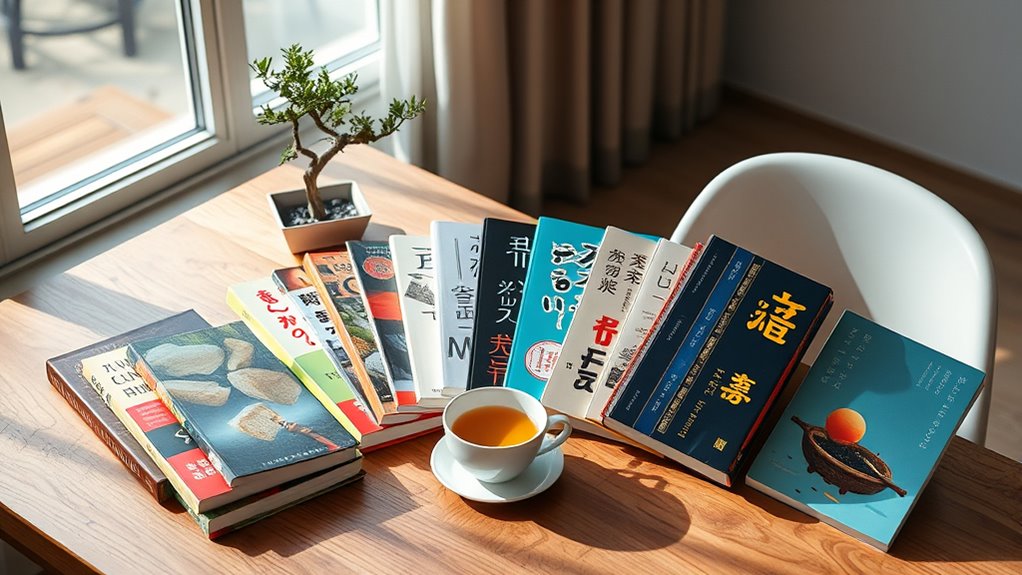If you’re looking for the top Ikigai books in English to find your purpose and fulfillment, I’ve got you covered. These titles explore Japanese philosophies like Ikigai, Kaizen, and Hansei, offering practical insights, reflection exercises, and cultural stories to help you create meaningful routines. Whether you’re new to these ideas or seeking deeper understanding, this list will guide you towards a more mindful and purpose-driven life—if you want to uncover more, keep exploring below.
Key Takeaways
- The list includes both practical guides and cultural insights, catering to beginners and those seeking deeper understanding of Ikigai.
- Many titles focus on actionable exercises, reflection tools, and daily routines to help discover purpose progressively.
- Books emphasize Japanese philosophies like Kaizen, Shinrin-yoku, and mindfulness, integrating them into personal growth practices.
- The selection features credible authors rooted in Japanese culture, ensuring authenticity and meaningful guidance.
- Some resources serve as quick overviews, while others offer comprehensive strategies for long-term fulfillment and self-discovery.
IKIGAI AND JAPANESE PHILOSOPHY: 3 Books in 1
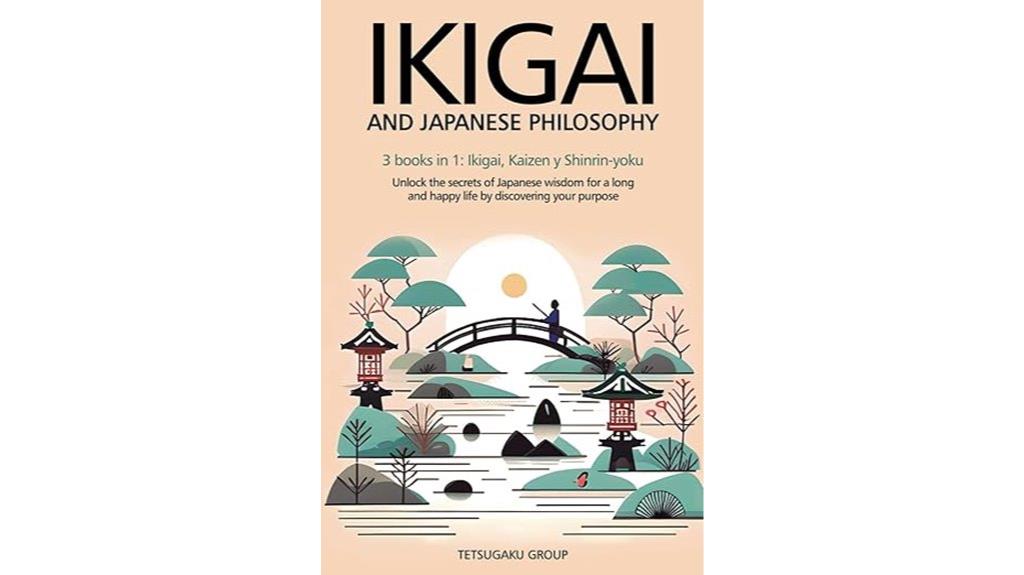
If you’re interested in exploring Japanese philosophies like Ikigai, Kaizen, and Shinrin-yoku in one all-encompassing read, this book might catch your eye. It combines three core concepts: Ikigai, the pursuit of life purpose; Kaizen, the idea of continuous self-improvement; and Shinrin-yoku, the practice of forest bathing for health. While it offers insights into discovering personal meaning, balancing life, and connecting with nature, some readers find the content superficial or repetitive. Despite its potential to introduce these philosophies, the book’s quality varies, and it may lack the depth needed for meaningful application. Use it as a starting point, but seek more extensive resources for growth.
Best For: those seeking a brief, introductory overview of Japanese philosophies like Ikigai, Kaizen, and Shinrin-yoku without expecting in-depth analysis or practical application.
Pros:
- Provides a quick introduction to key Japanese concepts of purpose, improvement, and nature therapy.
- Offers simple insights that can inspire initial self-reflection and curiosity.
- Combines multiple philosophies into one accessible, easy-to-read volume.
Cons:
- Frequently criticized for superficial content and repetitive ideas.
- Lacks depth, detailed guidance, and actionable strategies for meaningful growth.
- Quality issues such as poor editing, minimal visuals, and potential AI-generated material may diminish its credibility.
Ikigai Kaizen & Hansei: Japanese Philosophy & Wisdom Guide
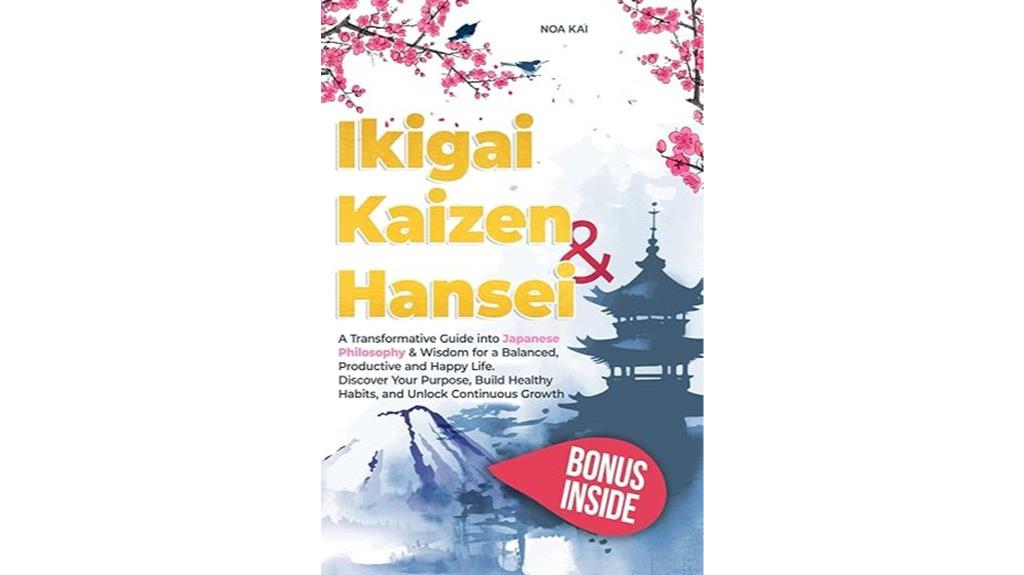
The “15 Best Ikigai Books” is an excellent resource for anyone feeling overwhelmed or seeking a deeper sense of purpose, especially those interested in Japanese philosophies. In *Ikigai Kaizen & Hansei: Japanese Philosophy & Wisdom Guide*, I explore timeless concepts that foster growth, balance, and happiness. I find this book’s clear explanations of Ikigai, Kaizen, and Hansei invaluable for integrating into daily life. It emphasizes small, continuous improvements, honest reflection, and mindful goal-setting. With practical tips and reflection tools, I feel more centered and intentional, making meaningful progress without stress. It’s a calming, accessible guide perfect for cultivating lasting fulfillment.
Best For: individuals feeling overwhelmed or seeking a meaningful, balanced life through gentle, practical Japanese philosophies.
Pros:
- Clear and accessible explanations of Ikigai, Kaizen, and Hansei, making complex ideas easy to understand
- Practical tips and reflection tools that can be integrated into daily routines effortlessly
- Emphasizes small, steady progress promoting mindfulness, reduced stress, and personal growth
Cons:
- Some concepts may feel surface-level and could benefit from deeper exploration
- The focus on simplicity might not satisfy readers seeking in-depth philosophical analysis
- Limited focus on cultural context for those interested in the broader Japanese traditions
Ikigai: The Japanese Secret to a Long and Happy Life
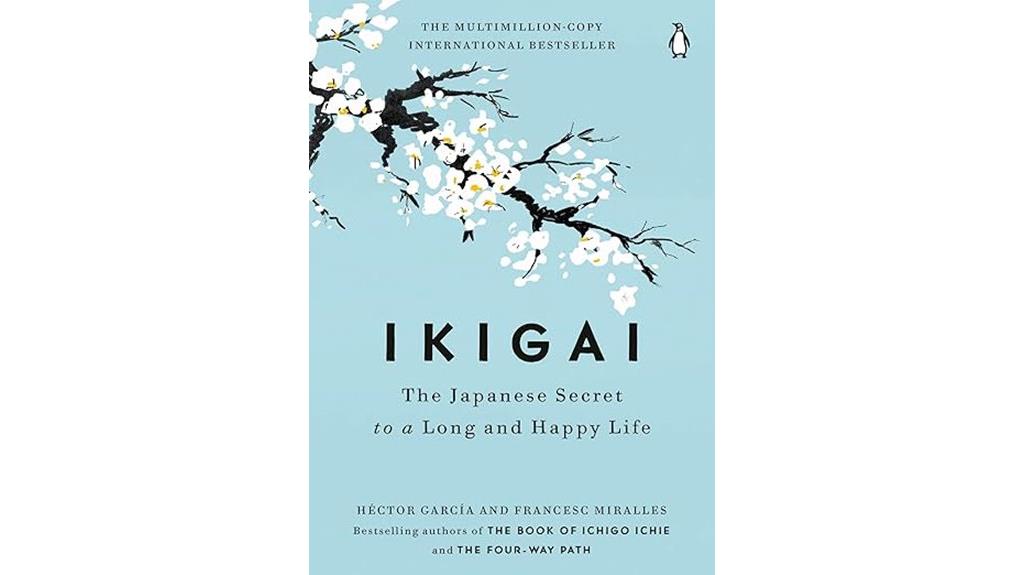
This book stands out for anyone seeking a practical, culturally rich guide to discovering their ikigai and embracing a more purposeful life. It explores how Okinawa’s residents, especially in Ogimi, embody this philosophy, contributing to their longevity and happiness. I appreciate how it combines insights from Japanese culture, Buddhism, Stoicism, and concepts like antifragility to deepen understanding. The author offers actionable exercises and reflective questions to help me identify my passions, strengths, and purpose. Living with intention, mindfulness, and balance becomes achievable through small, consistent steps. Overall, it’s an inspiring, accessible guide to cultivating joy, health, and a long, meaningful life.
Best For: those seeking a practical, culturally enriching guide to discovering their ikigai and living a more purposeful, joyful life.
Pros:
- Combines cultural insights with actionable exercises for personal growth
- Offers a holistic approach integrating mindfulness, balance, and purpose
- Suitable for a wide audience, from mid-career individuals to those in life transitions
Cons:
- Some readers may find the cultural references less applicable to Western contexts
- The focus on Japanese philosophies might require additional interpretation for some
- As a summary of broader concepts, it may lack deep, in-depth exploration of certain philosophies
IKIGAI and Japanese Philosophy: 3 Books in 1
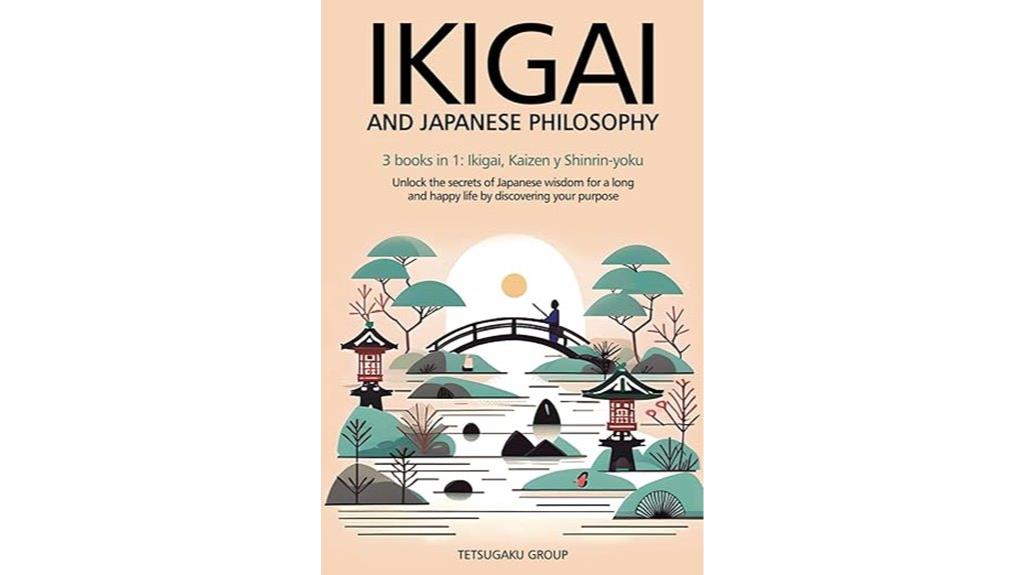
Readers seeking a thorough introduction to Japanese philosophies will find “IKIGAI and Japanese Philosophy: 3 Books in 1” particularly helpful. This book combines three core concepts: Ikigai, Kaizen, and Shinrin-yoku, offering insights into purpose, continuous improvement, and nature’s healing power. It provides practical exercises to align passions, boost self-awareness, and improve health through forest bathing. While some find it inspiring and useful for self-reflection, others criticize it for superficial content, repetitive ideas, and poor editing. Overall, it serves as a basic overview but may lack the depth and authenticity many serious learners seek.
Best For: individuals seeking an introductory overview of Japanese philosophies like Ikigai, Kaizen, and Shinrin-yoku for personal growth and wellness.
Pros:
- Combines multiple Japanese concepts into one accessible guide
- Offers practical exercises for self-awareness and health improvement
- Inspires reflection and positive mindset shifts
Cons:
- Criticized for superficial content and lack of depth
- Contains repetitive ideas and filler material
- Poor editing and production quality diminish overall usefulness
Ikigai: The Japanese Art of a Meaningful Life
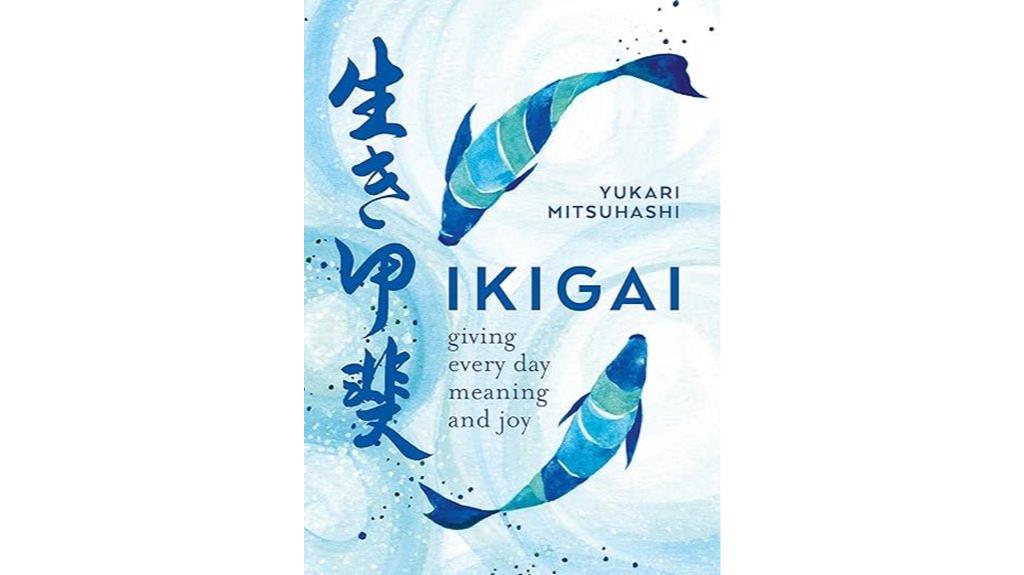
If you’re seeking a clear, accessible introduction to the Japanese concept of Ikigai, “Ikigai: The Japanese Art of a Meaningful Life” offers valuable insights for anyone curious about finding purpose and joy in everyday moments. Yukari Mitsuhashi explores Ikigai beyond a single passion, showing it’s woven into various aspects of life, from careers to hobbies. Through interviews with diverse individuals, she highlights that Ikigai isn’t a fixed goal but a daily practice rooted in small, meaningful actions. The book’s straightforward guidance encourages reflection on personal interests and routines, inspiring readers to discover happiness in their unique life journey.
Best For: individuals seeking an accessible, culturally enriching introduction to Ikigai and practical ways to incorporate purpose and happiness into daily life.
Pros:
- Clear and straightforward guidance suitable for beginners.
- Emphasizes that Ikigai is woven into various aspects of life, not just a single passion.
- Inspires reflection on personal routines and interests to find daily fulfillment.
Cons:
- Examples primarily focus on high-achieving individuals, which may feel less relatable.
- Some readers find the book too abstract, lacking concrete steps for diverse life situations.
- Less address on how everyday, ordinary people can discover their unique Ikigai.
EFINITO Ikigai Book by García and Miralles
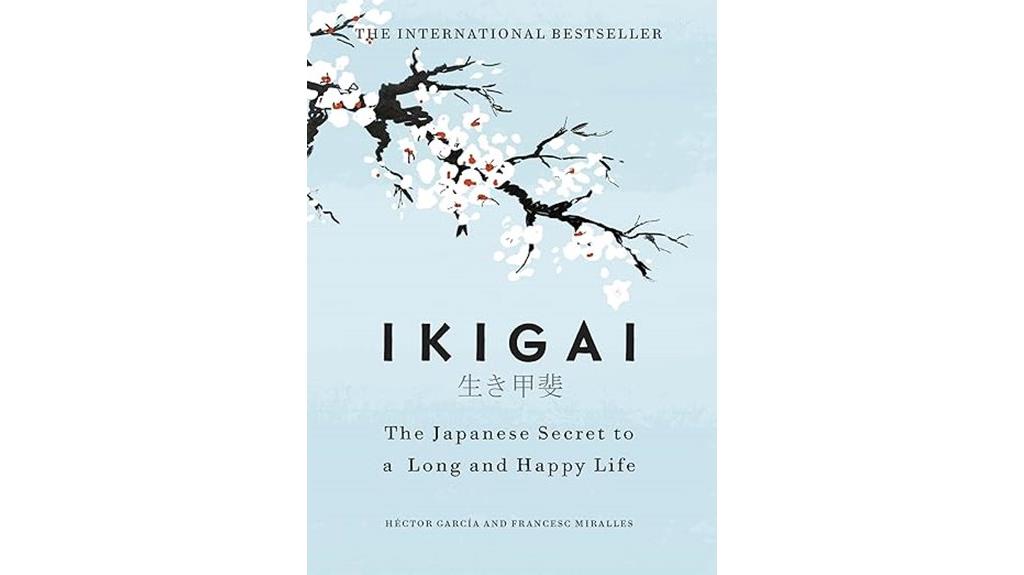
The EFINITO Ikigai Book by García and Miralles stands out as an essential read for those seeking a concise yet profound introduction to Japanese wisdom. I found it deeply impactful, describing itself as one of the most sacred books I’ve ever read. Its exploration of Japanese principles around diet, mental discipline, focus, and purpose resonated with me, inspiring reflection and action. Despite its brevity, it offers enough depth to spark curiosity about Japanese culture and philosophy. I appreciate how accessible and beautifully presented it is, making it perfect for newcomers and those wanting a quick yet meaningful dose of inspiration.
Best For: individuals interested in gaining a quick yet meaningful introduction to Japanese culture, philosophy, and principles of purpose and discipline.
Pros:
- Concise and accessible, making it easy for beginners to engage with Japanese wisdom
- Inspires reflection and motivates further exploration of Japanese traditions
- Beautifully presented, enhancing the reading experience with meaningful content
Cons:
- Limited depth may leave readers wanting more detailed insights
- May not provide comprehensive coverage of Japanese culture or philosophy
- Some readers might find the brevity insufficient for in-depth understanding
How to Find Your Ikigai: Master Japanese Wisdom in 21 Days
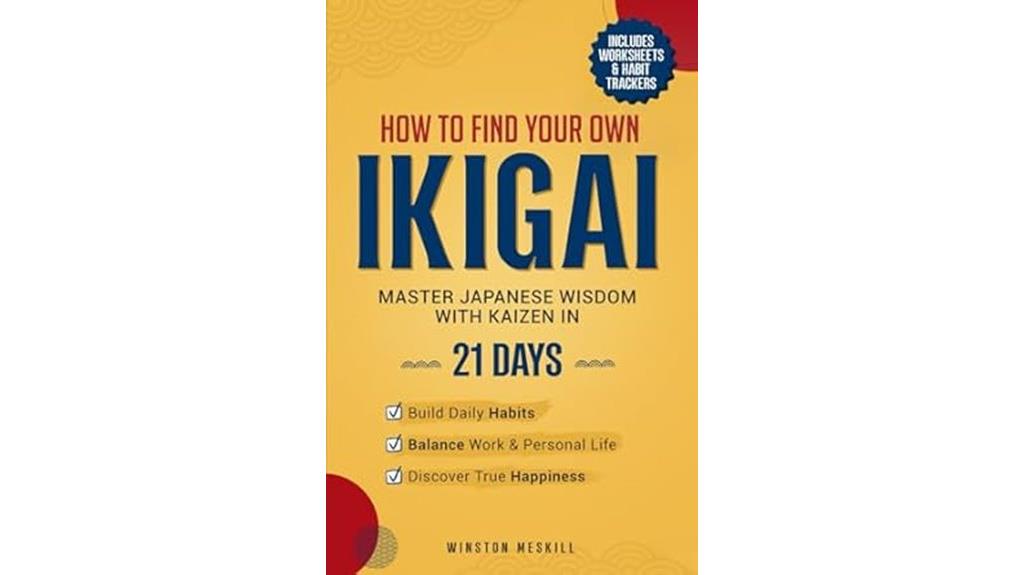
This guide is perfect for anyone enthusiastic to discover their purpose through a practical, step-by-step approach rooted in Japanese wisdom. Over 21 days, you’ll learn to apply core concepts like Ikigai and Kaizen—focusing on small, daily improvements that foster fulfillment and balance. Each day offers manageable actions, journaling prompts, and reflective exercises to help you develop meaningful habits without feeling overwhelmed. The plan encourages steady progress and self-awareness, making personal growth achievable and sustainable. Coupled with practical tools and cultural insights, this approach helps you uncover your purpose gradually while embracing Japanese philosophies for a happier, more intentional life.
Best For: individuals seeking a gentle, practical guide to discovering their purpose and cultivating personal growth through Japanese philosophies and daily micro habits.
Pros:
- Offers a clear, structured 21-day plan with manageable daily actions.
- Incorporates practical tools like journaling prompts and reflective exercises to deepen self-awareness.
- Combines cultural insights with actionable steps, making personal development accessible and inspiring.
Cons:
- Some users may find the focus on Japanese concepts less relatable to their cultural context.
- The 21-day timeframe might feel too short for those seeking more extensive transformation.
- Initial download issues with the workbook could inconvenience some users before resolution.
My Little Ikigai Journal: Japanese Secret to Living Happy and Purposeful Life
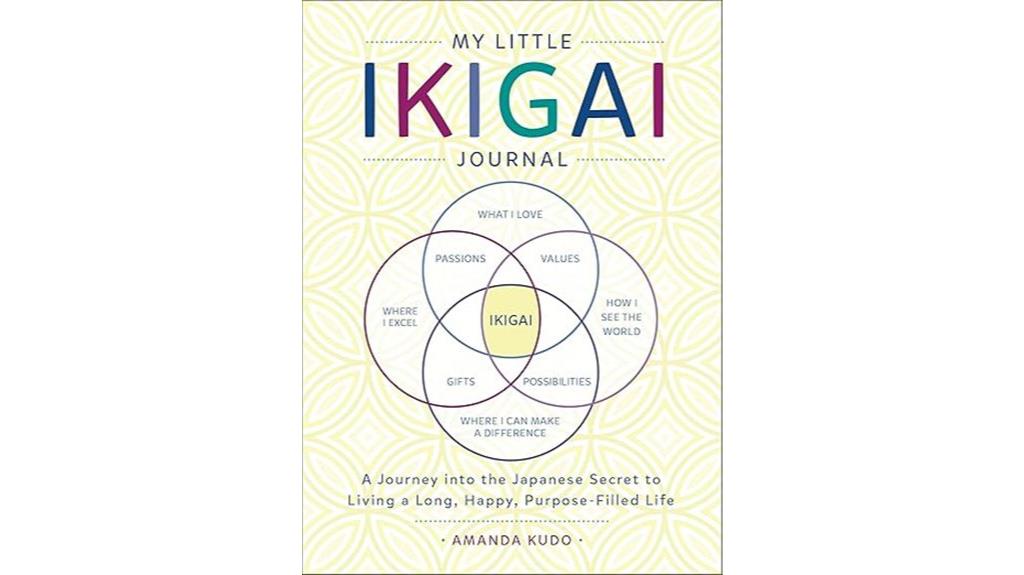
Anyone new to the concept of Ikigai will find “My Little Ikigai Journal” an ideal starting point to explore their purpose and happiness. This beautifully designed journal guides you through thought-provoking questions, inspired by Japan’s tradition of longevity and balance. It encourages self-reflection on passions, strengths, values, and life roles, helping you identify what truly matters. Filled with inspiring quotes and origami-inspired visuals, the journal makes the journey engaging and accessible. Whether you’re in progression or seeking clarity, it’s a practical tool to uncover your Ikigai, fostering long-term fulfillment in a busy, distraction-filled world.
Best For: individuals seeking an accessible, reflective tool to explore their purpose, passions, and strengths in a thoughtful, engaging way.
Pros:
- Encourages deep self-reflection through thought-provoking questions and inspiring visuals.
- Designed for beginners and those in transition, making it easy to start the journey of self-discovery.
- Combines traditional Japanese concepts with modern guidance, fostering long-term personal growth.
Cons:
- As a starting point, it may require supplementing with additional resources for comprehensive purpose exploration.
- The questions can be challenging or confronting, which might be uncomfortable for some users.
- Not a structured program, so users may need discipline to engage actively and consistently.
IKIGAI, KAIZEN & HANSEI Book on Japanese Wisdom and Daily Reflection
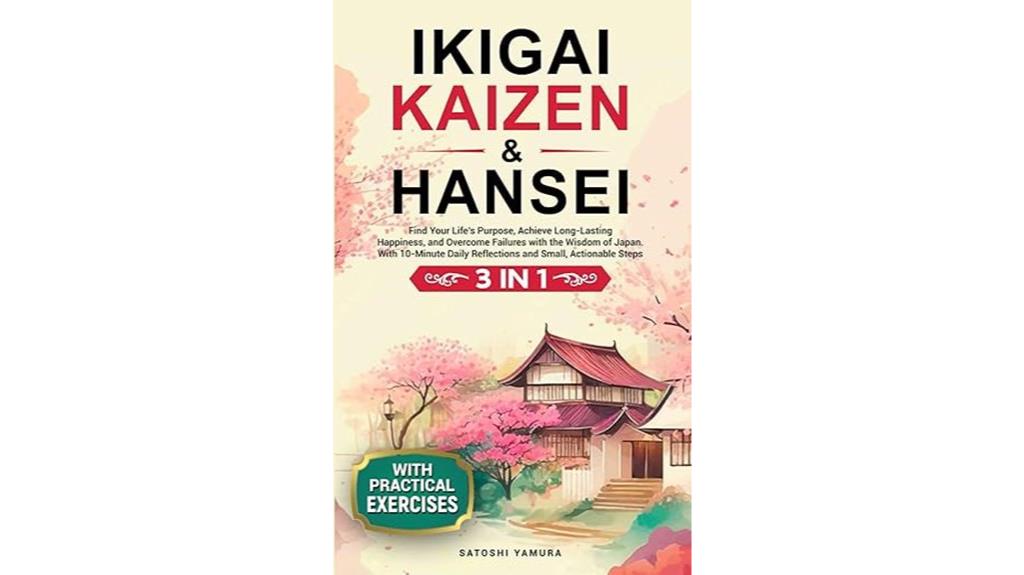
If you’re seeking practical guidance on integrating Japanese philosophies into daily life, the “IKIGAI, KAIZEN & HANSEI” book offers valuable insights rooted in timeless wisdom. It explores three core concepts: Ikigai (life’s purpose), Kaizen (continuous improvement), and Hansei (self-reflection). The book provides simple, actionable exercises like meditation and self-assessment, designed for just 10-minute daily practices. These methods help increase self-awareness, resilience, and happiness. I found it inspiring how these philosophies work together to promote progress, honest reflection, and a harmonious lifestyle. It’s a practical, accessible way to live more intentionally and find lasting fulfillment.
Best For: individuals seeking practical, daily guidance to incorporate Japanese philosophies of purpose, continuous improvement, and self-reflection into their personal growth and well-being.
Pros:
- Simple, actionable exercises designed for just 10-minute daily practices
- Promotes self-awareness, resilience, and a harmonious lifestyle
- Combines timeless Japanese wisdom with modern self-improvement techniques
Cons:
- May require consistent effort to see significant long-term results
- Some readers might find cultural references less familiar or harder to relate to initially
- The concise format may lack in-depth exploration for those seeking detailed philosophical analysis
The Ikigai Journey: A Practical Guide to Finding Happiness and Purpose
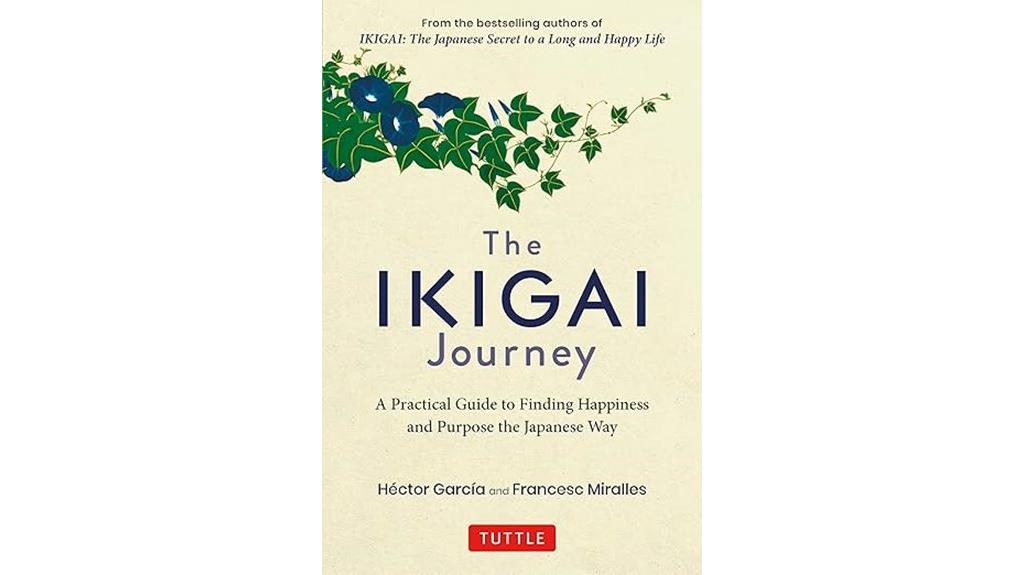
The Ikigai Journey: A Practical Guide to Finding Happiness and Purpose stands out as an essential read for those feeling stuck or uncertain about their life direction. I found it incredibly helpful in steering my own path, thanks to its practical exercises and clear insights. The authors use relatable metaphors like a bullet train journey to illustrate personal growth, making complex ideas easy to grasp. It emphasizes that understanding alone isn’t enough—you’ve got to do the work. This book offers reassurance and tools to help you discover your purpose, reduce fear of failure, and embrace transformation with confidence. It’s a must-have for anyone seeking genuine fulfillment.
Best For: individuals feeling lost or uncertain about their life purpose who seek practical guidance and self-awareness tools to find happiness and fulfillment.
Pros:
- Offers clear, accessible insights with practical exercises to encourage personal growth
- Uses relatable metaphors like a bullet train journey to simplify complex ideas
- Provides reassurance and confidence to embrace transformation and reduce fear of failure
Cons:
- Physical condition of the book may vary, which could affect the reading experience
- Some readers might find the content overly simplified or wish for more in-depth analysis
- As a cultural product rooted in Japanese philosophy, some concepts may feel less applicable to different cultural contexts
Awakening Your Ikigai: How the Japanese Wake Up to Joy and Purpose Every Day
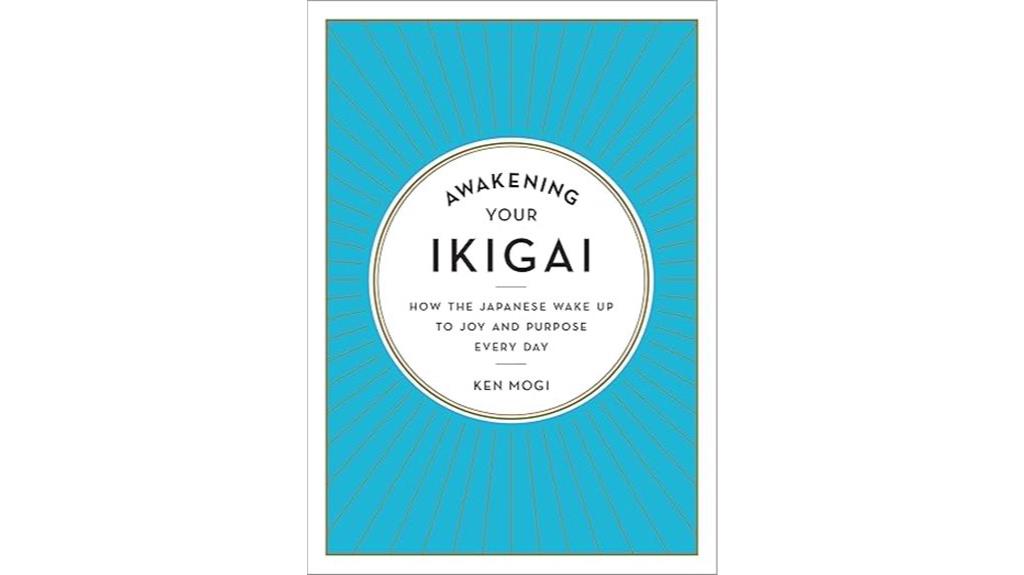
Awakening Your Ikigai: How the Japanese Wake Up to Joy and Purpose Every Day offers a compelling introduction to discovering daily fulfillment, making it ideal for readers seeking practical ways to find meaning in everyday life. Ken Mogi, a respected Japanese neuroscientist, combines scientific insights with cultural wisdom to show how ikigai—life’s purpose—can be integrated into daily routines. He emphasizes small, mindful actions, releasing self-imposed limits, and appreciating the present moment. Through stories of Japanese professionals, the book illustrates that ikigai isn’t complex; it’s about embracing simple pleasures and being present, fostering happiness and purpose every day.
Best For: individuals interested in integrating Japanese philosophies, mindfulness, and practical daily habits to find purpose and happiness.
Pros:
- Offers a concise, accessible introduction to the concept of ikigai with practical examples.
- Combines scientific insights with cultural wisdom, appealing to a broad audience.
- Emphasizes small, mindful actions that can significantly enhance daily life and well-being.
Cons:
- Some stories may feel repetitive or slightly forced according to certain readers.
- The brevity of the book might leave readers wanting more in-depth exploration.
- Cultural references may require some background knowledge for full appreciation by non-Japanese readers.
Ikigai & Kaizen: Japanese Strategies for Happiness and Success
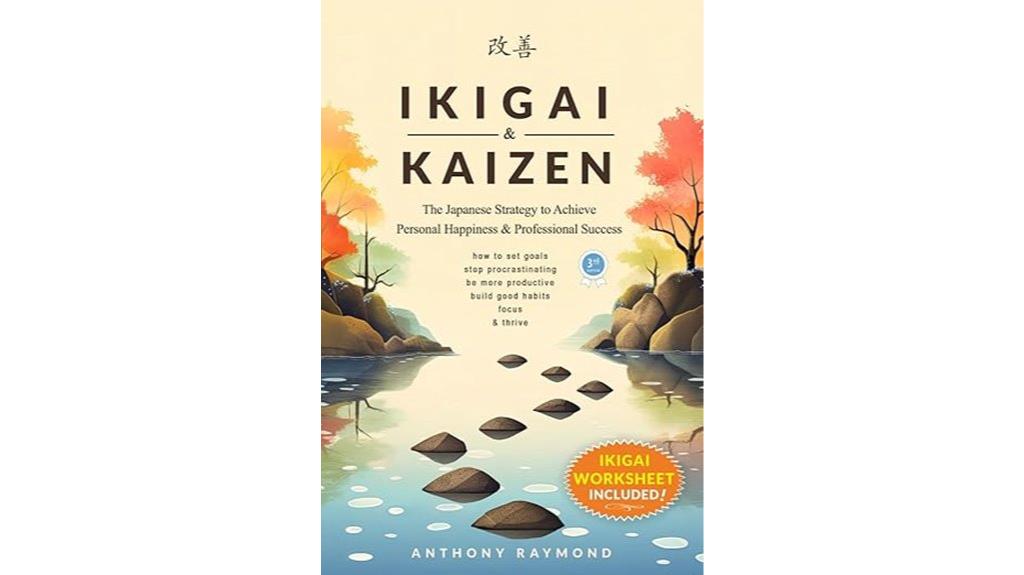
Anyone seeking practical, culturally rooted strategies to enhance happiness and success will find “Ikigai & Kaizen” especially valuable. This book explores core Japanese principles like Ikigai, Kaizen, Hansei, and Lingshi, focusing on small, consistent improvements and discovering personal purpose. It emphasizes self-reflection and embracing daily progress to overcome mental traps like procrastination and self-doubt. With actionable advice on goal-setting, habits, and time management, it offers a holistic approach rooted in Eastern wisdom. Whether you’re facing life *shifts* or seeking fulfillment, this book provides practical tools to foster growth, resilience, and a deeper sense of happiness.
Best For: individuals seeking practical, culturally rooted strategies to improve happiness, productivity, and personal growth through small, consistent changes.
Pros:
- Provides clear, actionable advice rooted in Japanese philosophies like Ikigai and Kaizen.
- Emphasizes holistic, daily practices that foster resilience and fulfillment.
- Well-researched with practical examples, making complex ideas accessible and applicable.
Cons:
- Some readers may find the discussions on health and gym setup tangential or overly detailed.
- The book’s focus on Japanese culture might feel less directly applicable to Western audiences without adaptation.
- Occasional wandering in topics can disrupt the flow for those seeking concise, targeted guidance.
The Ikigai Way: A Simple Path for Living a Life of Purpose
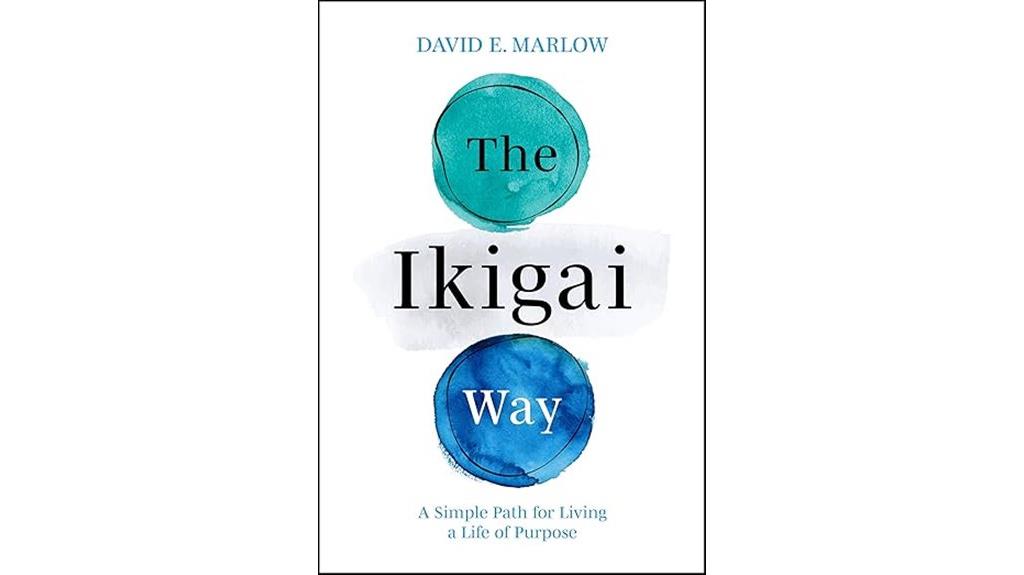
If you’re seeking a straightforward way to discover and live your purpose, *The Ikigai Way: A Simple Path for Living a Life of Purpose* offers practical guidance that resonates with those feeling stuck or unsure where to start. This book emphasizes small, consistent actions over drastic changes, helping you reconnect with what truly matters. It provides step-by-step instructions, worksheets, and real-life examples to define your purpose and cultivate habits aligned with it. The tone is calm and encouraging, making complex Ikigai concepts accessible. Whether you’re seeking personal growth or organizational transformation, this book empowers you to live intentionally and find lasting fulfillment.
Best For: individuals seeking a practical, accessible approach to discovering their purpose and living intentionally, whether for personal growth or organizational change.
Pros:
- Provides clear, step-by-step guidance with worksheets and real-life examples.
- Emphasizes small, consistent actions that foster sustainable change.
- Uses a calm, encouraging tone that makes complex Ikigai concepts easy to understand.
Cons:
- May be too simplified for readers looking for in-depth philosophical or spiritual discussions.
- Focuses primarily on practical application, which might overlook deeper emotional or psychological aspects.
- Some readers might find the emphasis on small actions less motivating for those seeking rapid transformation.
Ikigai, Kaizen & Hansei Book on Japanese Life Secrets
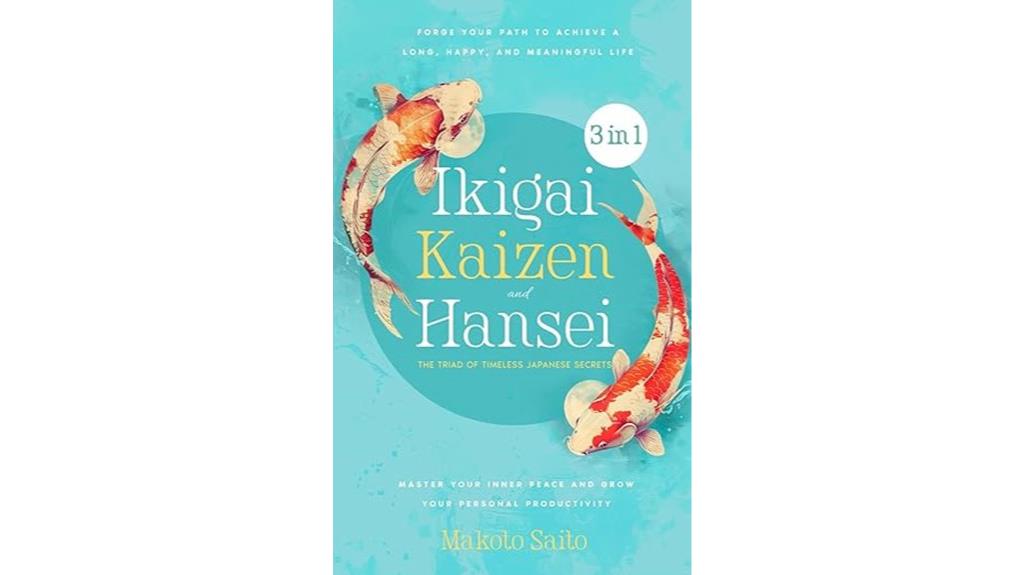
This book on Ikigai, Kaizen, and Hansei is ideal for readers seeking practical insights into Japanese philosophies that promote a balanced, meaningful life. It explores core concepts that encourage continuous growth, honest self-reflection, and finding purpose. I appreciate how it combines principles like incremental improvement with mindfulness practices such as meditation and Reiki to foster inner peace. The stories and quotes make these ideas relatable and inspiring. Although some might find the design plain, the wisdom offered is valuable for anyone wanting to deepen their self-awareness, embrace imperfection, and develop resilience through simple, effective daily practices rooted in Japanese tradition.
Best For: individuals seeking practical, mindful guidance rooted in Japanese philosophies to enhance personal growth, resilience, and inner peace.
Pros:
- Offers accessible insights into Ikigai, Kaizen, and Hansei for everyday application
- Combines principles with mindfulness practices like meditation and Reiki to foster inner calm
- Inspires reflection, self-awareness, and continuous improvement through relatable stories and quotes
Cons:
- Cover design is plain and may appear unremarkable compared to other motivational books
- Some readers find the writing style less engaging and desire a more dynamic presentation
- Perceptions of being overpriced given the scope and depth of content, with limited historical context
Little Book Of Ikigai
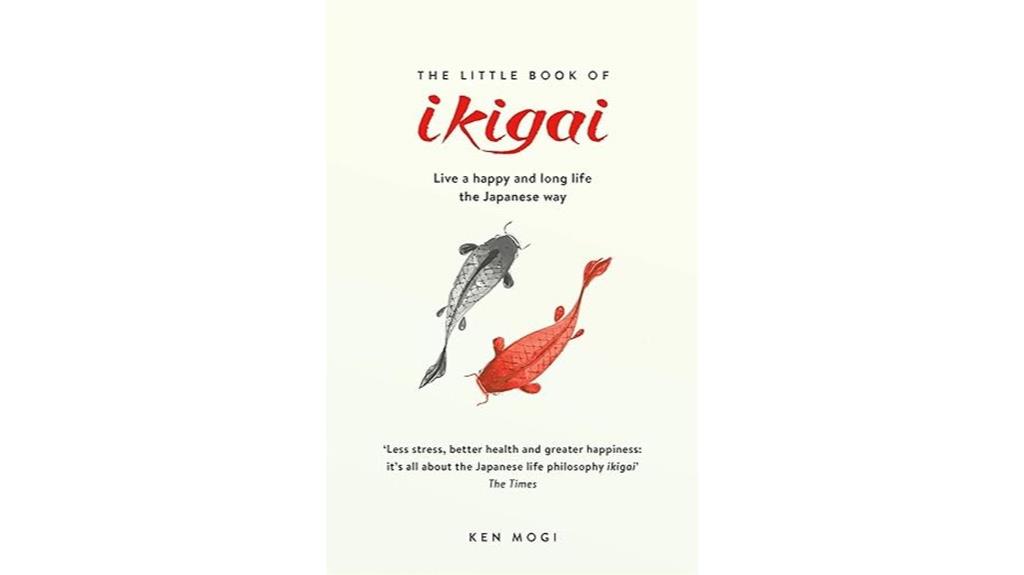
The Little Book Of Ikigai stands out as a perfect choice for readers seeking a gentle, accessible introduction to Japanese philosophy. I appreciate how it offers cultural insights into Japanese traditions and mindset, making the philosophy more relatable. Unlike typical diagrams, this book emphasizes finding Ikigai beyond just work or money, focusing on what brings joy and purpose. Its short, meditative style makes it ideal for daily reflection, often enjoyed with tea or coffee. I find its practical examples inspiring, encouraging self-discovery and well-being without overwhelming. Overall, it’s a calming, insightful read that deepens understanding of life’s true purpose.
Best For: readers seeking a gentle, culturally rich introduction to Japanese philosophy and practical guidance for discovering personal purpose and fulfillment.
Pros:
- Offers accessible, concise insights into Japanese traditions and mindset.
- Emphasizes finding Ikigai beyond work or money, focusing on joy and purpose.
- Provides practical examples and meditative style ideal for daily reflection.
Cons:
- Some readers find the ending rushed and lacking depth compared to earlier content.
- May lack detailed philosophical exploration for those seeking profound analysis.
- Its brevity might leave some wanting more comprehensive insights into Ikigai concepts.
Factors to Consider When Choosing Ikigai Books in English

When selecting an Ikigai book, I focus on content depth, cultural authenticity, and practical advice, because these factors guarantee I gain meaningful insights. I also consider the author’s background to gauge expertise and look for clear, accessible writing that’s easy to follow. These points help me choose books that truly resonate and provide actionable guidance.
Content Depth and Detail
Choosing an Ikigai book in English requires careful attention to its depth and detail to guarantee it aligns with your learning goals. I look for books that go beyond superficial summaries, offering thorough explanations of Ikigai concepts. Practical exercises, case studies, and cultural insights are essential, as they help me apply what I learn and reflect deeply. I also value books that explore related philosophies like Kaizen, Hansei, or Shinrin-yoku, which provide a more exhaustive understanding. Additionally, a good book should include background on the historical, cultural, and philosophical roots of Ikigai, enriching my perspective. Clear, step-by-step guidance and reflective prompts are key, ensuring I can engage meaningfully and foster long-term growth.
Cultural Authenticity Value
Selecting an Ikigai book that truly reflects Japanese culture requires attention to how well it captures the authentic roots of the philosophy. I look for books that reference Japanese traditions, history, and cultural practices, as these help ground the teachings in genuine context. When authors include insights from Japanese philosophers, elders, or cultural experts, I feel more confident about the book’s authenticity. I also value the use of traditional Japanese terminology, stories, and real-life examples from Japan, which deepen my understanding. Additionally, reputable books often cite research related to Japanese longevity and lifestyles, reinforcing their cultural integrity. Be cautious of superficial adaptations or generic self-help language that lack cultural acknowledgment; authenticity matters when exploring Ikigai’s true origins.
Practical Application Focus
To effectively apply Ikigai principles, look for books that provide clear, actionable exercises and reflection prompts. These tools help you actively engage with the concepts, making the journey more practical and personalized. Prioritize titles that emphasize strategies like habit formation, daily routines, or visualization to translate theory into everyday life. Books that include tools like journaling, step-by-step plans, or real-life case studies can guide you through implementation and inspire sustained growth. It’s essential to choose works focused on long-term development, promoting gradual, manageable changes rather than quick fixes. Such books empower you to integrate Ikigai into your daily habits, ensuring that your pursuit of purpose remains practical, realistic, and sustainable over time.
Author Expertise and Background
When exploring books on Ikigai, it’s important to take into account the author’s background to guarantee you’re gaining trustworthy and authentic insights. I look at their educational credentials and professional experience related to Japanese culture, philosophy, or personal development, as these lend credibility. It’s essential that the author has direct experience practicing or teaching ikigai or similar Japanese philosophies, which adds depth to their perspective. I also consider their publication history and reputation in the field, as well as their cultural understanding of Japanese traditions—these factors boost the book’s authenticity. Endorsements, reviews, or credentials further support the author’s expertise, helping me choose sources that are reliable and meaningful for my journey toward purpose and fulfillment.
Readability and Accessibility
Choosing an Ikigai book that’s easy to understand makes the journey more enjoyable and less frustrating. Look for titles that use clear, simple language and straightforward explanations to make complex Japanese philosophies accessible. Practical exercises, reflections, and journaling prompts can boost engagement and help you internalize concepts more effectively. Prioritize books with well-organized chapters and concise content, so you can grasp ideas quickly and reference them easily later. Avoid overly abstract or culturally dense language that might create confusion. Also, choose books with good visual accessibility—readable fonts, minimal clutter, and helpful diagrams or illustrations—to make reading comfortable. These factors ensure the material is approachable, encouraging you to explore your ikigai without feeling overwhelmed.
Visual and Design Quality
A well-designed Ikigai book can make a significant difference in how easily you grasp its concepts. Visually appealing covers with harmonious color schemes, often inspired by Japanese aesthetics, draw you in and set the tone. Inside, clear fonts, balanced layouts, and thoughtfully integrated images or illustrations enhance understanding and keep you engaged. Diagrams like Venn diagrams or flowcharts simplify complex ideas, making them easier to absorb. Aesthetic elements such as origami-inspired designs or minimalistic art can deepen cultural connections and create a calming reading experience. Conversely, poor visual quality—cluttered layouts, inconsistent fonts, or low-resolution images—can distract and undermine the book’s credibility. Prioritizing visual and design quality guarantees you select a book that’s both inspiring and easy to navigate.
Thematic Variety and Coverage
To make the most of an Ikigai book in English, it’s vital to look for one that covers a wide range of Japanese philosophies like Ikigai, Kaizen, Hansei, and Shinrin-yoku. This guarantees a thorough understanding of the core principles behind Japanese well-being. I also recommend choosing a book that explores different life aspects such as purpose, happiness, continuous improvement, and health, offering a well-rounded perspective. Practical exercises, reflection prompts, or actionable advice help translate theory into daily habits. Additionally, a good book should provide cultural context, historical background, and modern adaptations to deepen your understanding. Finally, look for varied perspectives, case studies, and examples from diverse life domains to keep the content engaging and relevant.
Price and Value Proposition
When selecting an Ikigai book in English, it’s crucial to contemplate how well its price reflects the value it offers. I look for books that strike a good balance between practical advice and philosophical insights, ensuring I get genuine value for my investment. If a book provides unique perspectives or fresh content that justify a higher price, I consider it worth the cost. Additional resources like exercises, workbooks, or digital content can also boost its value. However, I stay cautious of books with poor editing or superficial content, as these diminish perceived value regardless of price. Comparing prices with similar titles helps me gauge if the book’s depth and quality align with its cost, ensuring I choose wisely.
Frequently Asked Questions
How Can I Apply Ikigai Principles in Daily Life?
Applying ikigai principles daily starts with self-reflection. I take time each morning to identify what I love, what I’m good at, and what benefits others. Then, I set small, meaningful goals aligned with these passions. I stay present in my activities, appreciating the moment. By doing this regularly, I find greater purpose and fulfillment, turning everyday tasks into opportunities to live my ikigai.
Are These Books Suitable for Beginners Unfamiliar With Japanese Culture?
Imagine you’re setting sail on a new journey with a map that’s unfamiliar but promises discovery. These books are like that map—designed to guide you step-by-step, even if Japanese culture feels distant. As a beginner, you’ll find their lessons accessible and practical, helping you understand ikigai without needing deep cultural background. They’re perfect for starting your voyage toward purpose and fulfillment, no matter where you come from.
Do These Books Include Practical Exercises or Just Theory?
You’re wondering if these books offer practical exercises or just theoretical insights. I found that many of them include both—practical activities to help you reflect and discover your purpose, along with background theory to deepen your understanding. I appreciate when books combine action steps with explanations, because it makes the journey more engaging and effective. So, yes, most of these books balance theory with exercises to guide you practically.
Which Book Offers the Fastest Path to Discovering My Purpose?
You’re wondering which book offers the fastest path to discovering your purpose. I’ve found that *The Element* by Sir Ken Robinson accelerates this process because it combines inspiring stories with practical exercises. It helps you quickly identify your passions and strengths, guiding you toward clarity. If you’re enthusiastic to find your purpose fast, I recommend starting there—it’s engaging, actionable, and designed to spark insight swiftly.
Can These Books Help Improve Mental Health and Well-Being?
These books can definitely help improve mental health and well-being. I’ve found that exploring ikigai encourages mindfulness, self-awareness, and a positive outlook, which all boost mental resilience. By reflecting on your purpose, you may reduce stress and find more fulfillment daily. I recommend giving them a try—it’s amazing how understanding your ikigai can bring clarity and peace, ultimately supporting your overall mental health.
Conclusion
If you’re searching for the ultimate guide to discovering your purpose, these books are your secret weapon—truly life-changing! Immerse yourself in Japanese wisdom and open a path to fulfillment that feels almost magical. Whether you choose a comprehensive trilogy or a concise little book, each offers powerful insights. Trust me, these reads can transform your life more profoundly than you ever imagined—so don’t wait, start your journey today and embrace a life of true meaning!
